| Srl | Item |
| 1 |
ID:
135540
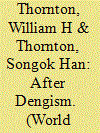

|
|
|
|
|
| Summary/Abstract |
The seeming departure of president Xi Jinping from Deng Xiaoping’s “pragmatic” moderation owes much to a highly tendentious misrepresentation of Deng’s core objectives. For 35 years, Dengism has been viewed through a globalist lens that flatly contrasts it with Maoist authoritarianism. From a post globalist vantage however, it appears that Deng’s reforms reconfigured rather than ended statist oppression. dengism was born out of the recognition that capitalism and authoritarianism were fully compatible and together were crucial for the survival of the CCP. “Opening China” China was Deng’s ironic mechanism for safeguarding against claims, which mandate a liberal corrective that Xi fears more than any other international contest. What he and other CCP elites dread most is a liberal post-globalisation that could foment a grassroots “China Spring”.
|
|
|
|
|
|
|
|
|
|
|
|
|
|
|
|
| 2 |
ID:
132635
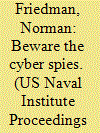

|
|
|
|
|
| Publication |
2014.
|
| Summary/Abstract |
In May, the U.S. government circulated a wanted poster showing five members of a shadowy Chinese cyber-espionage unit. No one expects any of them to turn up in a U.S. courtroom, but the object of the publicity was twofold. First, it was intended to show the Chinese that the U.S. government takes their operations seriously, that it can and will retaliate in some unspecified way. It is as pointless to ask the Chinese (and many others) to abandon cyber espionage as it would be to seek an international treaty barring any other kind of spying. The spies would stay in business, but some naive governments would abandon counterespionage, and cease any spying of their own.
|
|
|
|
|
|
|
|
|
|
|
|
|
|
|
|
| 3 |
ID:
159166
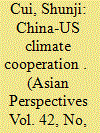

|
|
|
|
|
| Summary/Abstract |
Building “a new model of major-country relations,” particularly with the United States, has become one of China's major foreign policy objectives. Yet, outside of China, the concept is often seen as an empty slogan with no practical utility. By examining both the concept of the new model of major-country relations (NMMCR) and China's climate cooperation with the United States, I argue that the concept and initiative of NMMCR—with its emphasis on a common fate and shared futures, viewed as a means of achieving cooperation rather than conflict to achieve common goals— reflects well the changing environment of the twenty-first century and is thus a positive new development in China's foreign policy.
|
|
|
|
|
|
|
|
|
|
|
|
|
|
|
|
| 4 |
ID:
177300
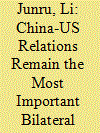

|
|
|
| 5 |
ID:
184219
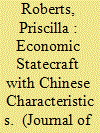

|
|
|
|
|
| Summary/Abstract |
The term “economic statecraft” is increasingly employed to describe China's use of economic resources to pursue objectives spanning the political, economic, and strategic spheres. One recent study suggests that “China's sophisticated use of economics in its foreign policy is still a fairly recent phenomenon.” Yet close scrutiny of how since at least the early 1900s Chinese leaders sought to use economic leverage as a foreign policy instrument suggests that the antecedents of contemporary Chinese economic statecraft date back to the founding of the People's Republic of China and even before. This special issue represents an effort to explore in some depth in what ways post-Cold War Chinese economic statecraft does indeed represent a novel phenomenon, as opposed to the simple continuation of earlier trends; to identify its most important features and follow its evolution over time; and to investigate in detail several specific recent case studies.
|
|
|
|
|
|
|
|
|
|
|
|
|
|
|
|
| 6 |
ID:
146540
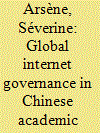

|
|
|
|
|
| Summary/Abstract |
This article explores the apparently ambivalent foundations of the notion of cybersovereignty as seen from China, through some of the most recent Chinese academic literature on global Internet governance. It shows that the sampled authors conceive of the current Internet order as an anarchic or disorderly space where global hegemons reproduce their domination over the world in the digital age. In the rather dichotomous world that this portrays, most of the authors concentrate their attention on the position and strategy of the United States, with a view to underlining the contradictions in American discourse through the PRISM scandal or the status of ICANN. In this context, most scholars studied here see the current situation, where Internet governance is increasingly debated, as an opportunity to rebalance the global Internet order and advance the strategic interests of China through the establishment of an intergovernmental Internet governance framework in the long term, and through active participation in the current status quo in the short term.
|
|
|
|
|
|
|
|
|
|
|
|
|
|
|
|
| 7 |
ID:
089145
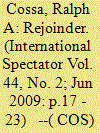

|
|
|
|
|
| Publication |
2009.
|
| Summary/Abstract |
The US-China relationship is one of the most important bilateral relationships in the world. As two of the world's largest economies, there can be no solution to the global economic crisis if the two work at cross purposes and many of the region's most complex security challenges - North Korean denuclearisation first among them - require Sino-US cooperation. The good news is that both US President Barrack Obama and Chinese President Hu Jintao are aware of and accept the shared responsibility and necessity for a cooperative approach toward dealing with the global financial crisis and regional security challenges; both have pledged to develop a "positive, cooperative and comprehensive" relationship and build mutual trust in a way that encourages, rather than worries, friends and allies in the Asia Pacific.
|
|
|
|
|
|
|
|
|
|
|
|
|
|
|
|
| 8 |
ID:
147300
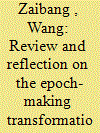

|
|
|
|
|
| Summary/Abstract |
The China-US relations have experienced four rounds of transformation since the 1970s. The recent transformation is of epoch-making significance. President Xi Jinping’s state visit to the US constitutes an important node of the transformation. The time of this transformation is relatively longer, and has been accompanied with frequent intensive and risky games. China should step up efforts to build confidence and reduce differences with the US to better control all possible crises and expand mutual cooperation. China should also strengthen its game consciousness and pay attention to the use of wisdom and skills.
|
|
|
|
|
|
|
|
|
|
|
|
|
|
|
|